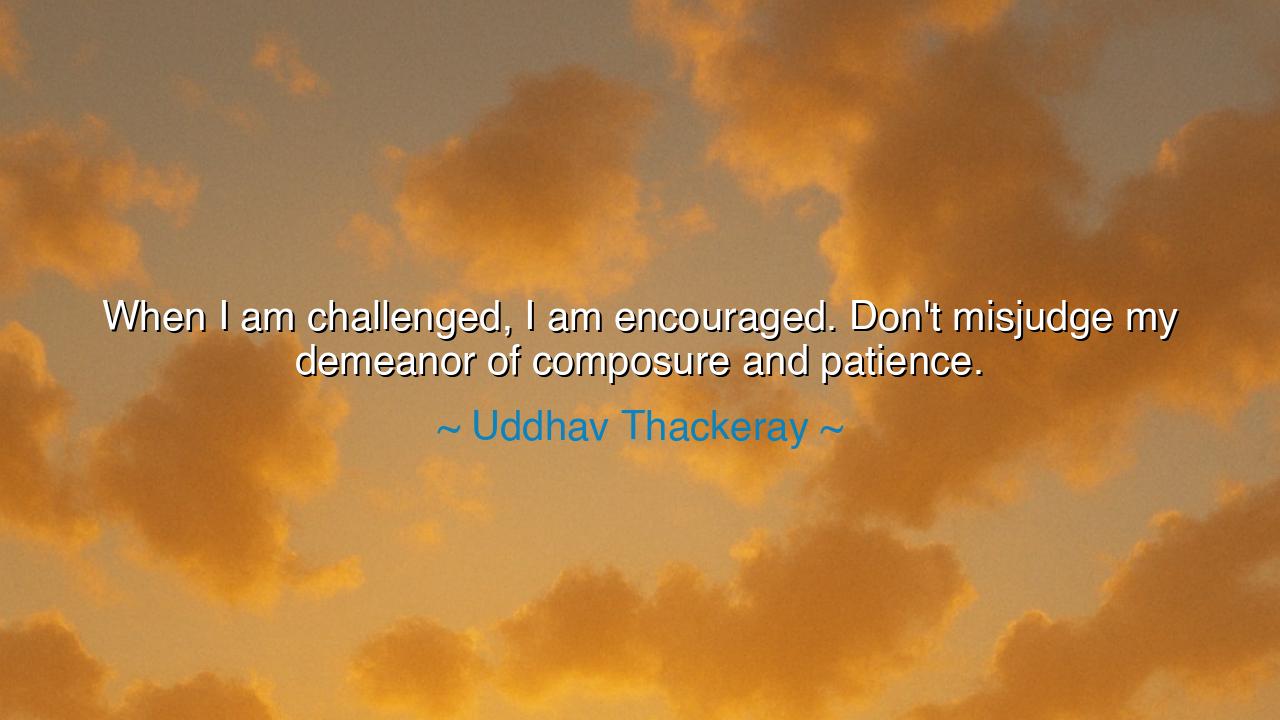
When I am challenged, I am encouraged. Don't misjudge my
When I am challenged, I am encouraged. Don't misjudge my demeanor of composure and patience.






The words of Uddhav Thackeray strike with the quiet force of a river that seems gentle yet hides currents strong enough to carve valleys: “When I am challenged, I am encouraged. Don't misjudge my demeanor of composure and patience.” In this saying lies a warrior’s heart clothed in the robes of stillness. For many mistake composure for weakness, and patience for surrender. Yet in truth, these qualities are shields and swords in disguise — the strength to remain unshaken when storms rage, and the wisdom to act only when the moment is right.
The meaning here is layered. To be challenged and yet feel encouraged is the mark of one who does not fear adversity, but embraces it as fuel. Obstacles that break lesser spirits become nourishment to those who are steadfast. Just as the mountain welcomes the battering wind, knowing it cannot be moved, so too does the composed man welcome opposition, knowing that it will only reveal his depth of strength. Challenges are not curses to such a person, but confirmations that the path they tread is worth walking.
Yet the warning is sharp: “Don't misjudge my demeanor.” How often do people confuse quietness with fragility, or restraint with incapacity? Many in history have underestimated the patient ones, only to discover too late that beneath their silence burned a fire unquenchable. Patience is not passivity; it is controlled strength, like a bow drawn but not yet released. The one who waits is not idle, but preparing, storing energy for the decisive moment when action will be most effective.
History offers many examples. Consider Mahatma Gandhi, whose composure and patience in the face of British power led many to believe he was weak. Yet it was his restraint, his refusal to lash out in anger, that gave him moral strength and drew millions to his cause. His enemies mocked his stillness, but in the end, it was the quiet force of his patience that toppled an empire. Gandhi, like Thackeray, proved that true strength often wears the appearance of calm.
Another lesson shines from the life of Abraham Lincoln. During his presidency, he endured scorn, defeat, and fierce opposition. His demeanor was often one of calm reflection, his patience in dealing with allies and enemies alike mistaken by many for indecision. Yet when the time came, his decisions were iron, unbending, and history now remembers him not for weakness but for unshakable resolve. His patience allowed him to strike with precision when the fate of the Union hung in the balance.
Thus, Thackeray’s words carry a teaching for all generations: do not be deceived by appearances. Composure is the fortress of the strong, patience the weapon of the wise. To remain calm in the face of trial is not to yield, but to master oneself; and the one who masters themselves is greater than the one who conquers a city. Challenges should not discourage but awaken courage, for they reveal hidden reservoirs of endurance within the soul.
The lesson for us is this: cultivate patience as a daily discipline. When challenged, resist the urge to react in haste. Instead, let the trial strengthen your resolve. Wear composure as your armor, for it confuses the reckless and steadies your own spirit. Remember that true power is not the loudest roar, but the silent confidence that waits until the moment of action arrives.
Let this wisdom be passed down: the patient are not weak, and the composed are not passive. They are the pillars that endure when others crumble, the fires that burn steady while others flare and die. When you are challenged, let it encourage you; when you are underestimated, let it prepare you. For in patience lies victory, and in composure lies greatness.






AAdministratorAdministrator
Welcome, honored guests. Please leave a comment, we will respond soon